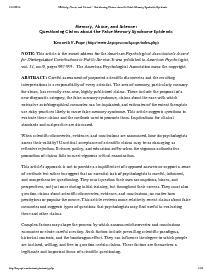Memory, Abuse, and Science : Questioning Claims about the False Memory Syndrome Epidemic
Careful assessment of purported scientific discoveries and the resulting interpretations is a responsibility of every scientist. The area of memory, particularly memory for abuse, has recently seen new, highly publicized claims. These include the proposal of a new diagnostic category, the false memory syndrome; claims about the ease with which extensive autobiographical memories can be implanted; and estimates of the extent therapists use risky practices likely to cause false memory syndrome. This article suggests questions to evaluate these claims and the methods used to promote them. Implications for clinical standards and malpractice are discussed.
Geachte bezoeker,
De informatie die u nu opvraagt, kan door psychotraumanet niet aan u worden getoond. Dit kan verschillende redenen hebben,
waarvan (bescherming van het) auteursrecht de meeste voorkomende is. Wanneer het mogelijk is om u door te verwijzen naar de bron
van deze informatie, dan ziet u hier onder een link naar die plek.
Als er geen link staat, kunt u contact opnemen met de bibliotheek,
die u verder op weg kan helpen.
Met vriendelijke groet,
Het psychotraumanet-team.
In: American Psychologist ISSN: 0003-066X (print) 1935-990X (web) | 51 | 9 | 957-974
https://psycnet.apa.org/doiLanding


